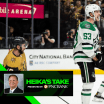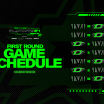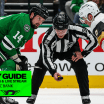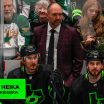When we catch up with the original voice of the Dallas Stars, Ralph Strangis, he's getting over jet lag from having called Olympic hockey games for Westwood One Radio in South Korea and having done ice-level commentary for the NHL's Stadium series game between Washington and Toronto at the U.S. Naval Academy in Annapolis, Maryland.
From 'the move' to Cup glory, Strangis experienced it all
The original voice of the Stars reflects on his time with the organization and shares his favorite memories
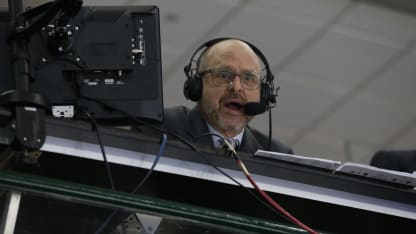
© Tim Heitman
Scott Burnside: So, what was that experience in South Korea like?
Ralph Strangis:It was really different. The only teams I knew really were the U.S. women's team, right? Because you kind of know them, you know about them, and I knew a little bit the Russian team -- the men's team. Beyond that, you're starting from zero pretty much every game. I'll try and say this is in the least offensive way I can put it: The tournament is not the same without the NHL guys, and I have evolved on that issue. I always thought it was sort of a tough go for the NHL. I understood and empathized with the business reasons for not doing it. However -- and I still believe the Stars aren't going to sell more tickets to see Calgary on Wednesday because the NHL went to the Olympics -- there's no co-relation there, I don't think. The tournament is way better when they're there -- waybetter. There was one men's team there, really. The Russians were the only men's team there and the rest of it was tough, so preparing for those games was hard. Kenny Albert, Gord Miller and I sat in the stands and listened to Eliteprospects.com for the pronunciations of the players. I had a rule, I said to my guys at Westwood One, I said let me tell you my rule. The rule is how Kenny Albert says it is how we're all going to say it, and that's how it went.
SB: So you get the tape recorder when you're 10 years old. Do they get what you're about to unleash on the world?
RS:I said one time in front of my Grandpa Ray, I said, 'Do you remember what my first word was?' He goes, 'I don't know, but you haven't quit talking since.' I was in my basement when I was a kid. We'd put up cardboard boards with the NFL Today with the scores from the games out of town, and I'd make my brother go upstairs and get the scores and I'd have whoever was in the house come down and I'd do the halftime scores. That's how I was. They always knew -- my parents knew. I had a very interesting background where my dad is a Type A -- driver, corporate attorney, very sports minded. And so, we went to Vikings games and we went to Twins games and we went to North Stars games. And my dad, in fact, represented the first ownership group that came to Minnesota with the North Stars, and then he also worked for the Gunds (former owners of the North Stars). So, finally, when he had no connection, I was able to get a job. And then my mother is very much into the arts and music and theater and like that, so I've always had that other. She took me to Led Zeppelin and Cat Stevens and Steve Martin standup, so I've always sort of had that eye on, I want to be on TV, I want to be on radio -- I want to do this for a living. I think they put up with a lot of it. I was out there. I was always in front of stuff. I was always on stage. But they were always very supportive of it.
SB: You've indulged your passion for that artistic side of things. You've been in plays and done some acting. When you do something like that, not saying you're at an advanced age, but at a different stage of your career, how refreshing or how gratifying is that?
RS: I think the older I get, the fewer things are available for me to try for the first time. I'm always looking for stuff to try for the first time. I'm not scared about that. I don't have that same security that I once had in terms of economically and professionally, but that's also opened (things) up. Like, I would never have been able to go to the Olympics. I would never have been able to write a really bad novel. Now, I'm working on a book I'm going to have ready by May, which is called "What They Don't Teach You In College," and I'm also doing some documentary film work with Fox Sports Southwest, where we're working on a project now. I'm writing op-eds for the Dallas Morning News and I'm going on stage -- stuff that I would have never, or have been less likely to do. I mean, I couldn't tell you the difference between the 2011-12 season and the 2012-13, other than we might have gone to Vancouver one more time. It all seemed to meld together. For a variety of reasons, I was like, maybe, there's more out there for me, and maybe I have some other opportunities out there that I could indulge in. I did it, and I don't -- regret's the wrong word -- I'm excited for the challenges I've already faced and I'm excited for what the next phone call might bring because I haven't applied for any of these jobs. The Olympics or the Stadium Series or the Kings -- like, I did 30 games for the Kings last year. The phone just rings. So that's been kind of fun. I thought I was done with hockey, but hockey wasn't done with me apparently.
SB: Tell me the story about how you ended up with the North Stars job. It sounds completely out there where four or five of you split up calling three periods.
RS:How do things happen, right? At that time, I had just finished doing -- the American Wrestling Association had folded (and) I was their last play-by-play man. Prior to that, the Women's Professional Volleyball League had folded. I was the play-by-play man for the Minnesota Monarchs and the Chicago Breeze. I was doing freelancing and stuff. A friend of mine I'd met at a wedding, Dan Mandich -- a short-time defenseman with the Minnesota North Stars -- I happened to sit next to him at a wedding, and he called me out of the blue and said, 'I got this call. This new guy, Norm Green, bought the team (the North Stars) and he fired everybody except Al Shaver on the radio. And they're looking for broadcasters and they want me to audition. I don't think I'm the right guy, but I think that maybe you are.' And I said, well, I'm not an analyst, I'm a play-by-play guy. So, I called them up. (And they) said we're looking for somebody to not only be the analyst, but you've got to do between period interviews, you've got to do the pre-game show … and if we need somebody to be able to do the games, you've got to do the games. And I thought, well, that sounds like me. So, I went and we had an audition in St. Cloud Minnesota at a preseason game. It was me and Bob Paradise -- former North Stars player -- Dan Stoneking, who was a local media guy in Minneapolis, a sports writer, Dan Mandich and me. Mandich and I split the third period and I did the last half of the third period into a tape recorder in St. Cloud -- Winnipeg Jets versus Minnesota North Stars, preseason game.
I think when I got there, I was the only guy that was a broadcaster. So when the producer said, 'Well, who can do the pregame interview?' I said, 'I will. How do you want it tagged and what's the intro what's the outro?' The guy kind of looked at me and said, 'Oh, maybe we have somebody here.' And so, I did that for three years, and when the North Stars moved, Al (Shaver) didn't want to move. I called Norm Green and I said, 'Look, I got a year left if you want me there (in Dallas), I'll come. I think I can help you, but if you don't want me there, tell me and we'll work something out and I'll go do something else.' He said, 'No, I want you to come down.' So, I came down and stayed in the analyst chair for three more years. I was a terrible analyst. Frigging terrible. But for Andy Murray, Doug Jarvis, Rick Wilson -- guys like that who helped coach me up, my career as an analyst, I mean, I had over-reached already. You've got to learn your limitations.
When the play-by-play job opened up, I applied for it. I went to Jim Lites' office, I gave him an application, and I said, 'I want this job.' He said, 'Okay, find me a color (commentator).' I said okay. You'll like this story. So, Doug Armstrong came to me and said, 'I just played golf with this guy. He's really funny, and I think you'll like him.' I'd looked at tape of maybe four or five guys and they were okay, and I'd called Panger (Darren Pang) and a couple of other guys and they couldn't do it or whatever, and he (Armstrong) said, 'Call Daryl Reaugh.' So I called Daryl Reaugh, and I said, 'Send me a tape. I'll look at the tape and I'll give it to Jim Lites.' And I looked at the tape and I walked into Lites's office and I said, 'This is our guy. This is our guy. Believe me when I tell you, this is our guy.' They flew him in the next week and they hired him like a week later. It was quite evident how talented he was and it just worked out perfect, and we had a very good run together.
SB: Do you have a specific memory of things at the beginning or memories of what formed the bedrock of what was a tremendous run for you?
RS: Well, I probably have 25 or 30 plaques from Lions Clubs and Rotary Clubs for speeches I made that first year. What I remember is that I was the first guy here from Minnesota. I was here Memorial Day of 1993, I came in that weekend and there was nobody here. It was me. I sat down with community relations and PR and I was like, 'Get me out there.' You set 'em up, I'll knock 'em down. I made a video and we worked with our TV partner. We had to buy our way onto the air -- that's where the simulcasts came from. We had no money. Jim Lites came about a month or so after I got there. When Jim Lites came and Jeff Cogen came and I started to talk to them a little bit, I went, 'Okay, we got something here. We got something here.' Because when you talk to Jimmy, Jimmy can sell a ketchup Popsicle to a woman wearing white gloves. We were salesmen. I think what I remember most about that first year is that we were salesmen and we had to sell this thing when there was nothing to sell. Then, the team had a really good year and that helped. They made the playoffs and we won a round, and then we had Mike (Modano). We had Mike. Where other franchise might struggle to get out of the gate or look to see how they might put their flag in the ground -- your Arizona's or your Columbuses or whatever -- we had Mike Modano. That was the biggest difference. At a time when the Cowboys were out of their run, the Mavericks weren't very good. The Rangers were awful. There was an opening and we grabbed it.
SB: This is still home for you. Could you have imagined that Memorial Day weekend that this would be your home and that you would have such a longstanding connection to the franchise and the community?
RS:I've always been really proud of that. I've been really proud of being part of something from nothing, right? And really, being there for all the big moments -- the new building and Stars Centers opening and learn-to-skate programs and Ice Girls. I was on the original Ice Girls committee and, yeah, it was tough duty, but somebody had to do it. But listen, let me tell you something: That was a tough one because we were one of the first crews. We had to deal with a lot of flak over that, and we kept our backbone and it worked out great and they're a big part of it now. Then, seeing Celena Rae on American Idol and calling Geoff Moore and saying, 'I found our new anthem signer and I'm going to find her and I'm going to bring her in.' All those things. That's the stuff. The community is the stuff that I'm proud of and that I miss. I miss helping the sales people make calls -- I'd do that in the summer. I miss going into the office and I miss seeing the young hockey players. I miss the fans and I miss being around that. Because right now, I'm plugging in and out of temporary communities, and I had this full-time community and I miss it. That was my family for so many years. And so, no, in 1993, it was a job and I was young, and I lived across the street from Mike Modano and we'd ride to the game together. We were just young guys having fun. But I got married here. I had my daughter here. I have friends here, and every time I think about leaving, I kind of talk myself out of it. I love it here ... and for them to invite me back, and for me to want to come back like this, is really great because it is a big part of my life, and so many things have happened for me around it. I'm just so thrilled to be coming Friday.
SB: One final question: If you're out and about, do you ever come across your call of the Brett Hull goal, and what happens when you hear your voice announcing the greatest moment in this franchise's history?
RS:Well, it reminds again of being a part of a community. It reminds me of that night, and that Tom Hicks had flown all the families in. We were all in it together, and the flight back with all of us. Everybody wants to win it at home, but I'll tell you what, the road is really cool because it's that core group that you've been with in the bunker for so long. Again, it reminds me of such a very big part of my whole life, and I'm 57 years old now. I did over 2,000 games for the franchise. I don't remember what happened, I don't remember the games. Honestly, I can't remember them. But I remember the feelings and I remember the people. I remember seeing some of the staff that had been with them from the beginning in the locker room that night and had all done that journey together. I remember sitting next to Hitch (Ken Hitchcock) in the dressing room, and I had a cigar and he was drenched in champagne and we were both kind of collapsed. And I have a photo someplace, I don't know where it is, but we're both just collapsed on top of each other. So, when I hear that call, it reminds me of just a really good time with people that I care about -- and that I still care about. I have more a feeling about the people than I ever did about the moment of the game or the championship, so that's what I think about.
Ralph Strangis returns to American Airlines Center on Friday, where he will be honored throughout the Stars' game against Anaheim as part of the team's 25th Anniversary Reunion Nights. For more information, and to purchase tickets, click here.
This story was not subject to approval of the National Hockey League or Dallas Stars Hockey Club.
Scott Burnside is a senior digital correspondent for DallasStars.com. You can follow him on Twitter @OvertimeScottB, and listen to his podcast.

